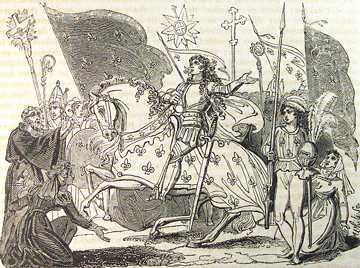Joan of Arc
Joan of Arc was a farmer's daughter with an extraordinary mission: to break the English siege of Orleans (ancient seat of the French kings) and restore the Valois heir to the throne of France.
Inspired since the age of 13 by voices (according to Joan, the saints Michael, Catherine, and Margaret), she enlisted the aid of a French captain to gain audience with the Dauphin*. Convincing Charles* and his staff of theologians of her divine calling, she was assigned royal troops to carry out her mission.
An early feminist?
Joan dressed and armed herself as a man* (to the horror of her later judges), but it was her energy and confidence that inspired her followers more than her prowess in battle. Her amazing successes in liberating Orleans (May 1429), defeating the English at Patay*, and crowning the Dauphin at Rheims were quickly attributed by her enemies to black magic; captured by Burgundians early in 1430, she was sold to the English and put on trial for witchcraft and heresy (claiming direct communication with God).
She endured harsh treatment bravely, then recanted and was sentenced to life imprisonment. But she later resumed dressing as a man, and, abjuring her confession, was burnt at the stake.
Charles' coronation was symbolically a major setback to the English; by raising French morale Joan's example contributed greatly to turn the tide of the Hundred Years War, well earning the Duke of Bedford's (and Shakespeare's*) sour portrayal of her as "a disciple and limb of the fiend."
Footnotes
-
Holinshed on Joan:
In time of this siege at Orleans (French stories say), the first week of March, 1429, unto Charles the Dauphin. . . was carried a young wench of an eighteen years old, called Joan of Arc . . . Of favor was she counted likesome, of person strongly made and manly, of courage great, hardy and stout withal; an understander of councils though she were not at them; great semblance of chastity both of body and behaviour; the name of Jesus in her mouth about all her businesses; humble, obedient, and fasting divers days in the week. A person (as their books make her) raised up by power divine, only for succor to the French estate then deeply in distress.
(154) -
The ungrateful Charles
Charles was later remarkably ungrateful for Joan's services, withdrawing his support after his coronation and making no attempt to ransom her from her captors (despite the appeals of her followers). His reasons for this behaviour are unclear: he may have considered Joan's usefulness to have expired, or perhaps hesitated to emphasize his association with an accused witch.
-
Dressing as a man
For a woman to dress as a man was taken as a sign of the natural order disrupted. Holinshed described her appearance thus:
On warfare rode she in armor cap-a-pie [head to food] and mustered as a man; before her an ensign all white wherein was Jesus Christ painted with a flower-de- luce in his hand.
(155) -
A familiar name
Holinshed's account of the defeat includes a reference that may have led to the creation of one of Shakespeare's most memorable characters:
". . . the charge was given so upon a sudden by the French that the Englishmen had not time to put themselves in array after they had put up their stakes before their archers; so that there was no remedy but to fight at adventure. This battle continued by the space of three long hours, for the Englishmen, though they were overpressed with multitude of their enemies, yet they never fled back one foot till their captain the Lord Talbot was sore wounded at the back, and so taken.
Then their hearts began to faint and they fled, in which flight were slain above twelve hundred, and forty taken. . . . From this battle departed, without any stroke stricken, Sir John Fastolf, the same year for his valiantness elected into the Order of the Garter." -
Unflattering portraits
Both Holinshed and Shakespeare were scathing in their view of Joan:
- Holinshed:
. . . These matters may very rightfully denounce unto all the world her execrable abominations, and well justify the judgment she had and the execution she was put to for the same.
(158).
- Shakespeare:
Pucelle [i.e. Joan]: The regent [York] conquers, and the Frenchmen fly.
Now help, ye charming spells and periapts [amulets],
And ye choice spirits that admonish me
And give me signs of future accidents.
(Henry VI, Part One, 5.3.1-4)Joan is, however, given some sympathetic words in her trial:
Because you want the grace that others have,
You judge it straight a thing impossible
To compass wonders but by help of devils.
(Henry VI, Part One 5.4.46-8)
